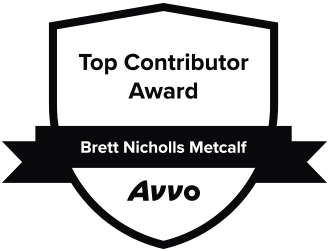When you have been charged with a second offense DUI in Tampa, you could be facing significant penalties. Since you have a prior conviction on your record, the consequences of a guilty verdict could have a devastating impact on your life.
Make sure you understand the significance of the charges against you by retaining a powerful second offense DUI lawyer. Metcalf Falls, Criminal Defense Attorneys, P.A., has what it takes to help you clear your name. Start working on your defense strategy as soon as today when you contact our office for a confidential case evaluation by calling (813) 258-4800.
When Can You Be Charged with a Second DUI in Tampa?
The state of Florida takes second offense DUIs seriously. Whether your DUI is considered a second offense will vary considerably depending on the look-back period in your case.
Generally, the look-back period is five years for DUI cases. This means if you have previously been charged with or convicted of a DUI within the last five years, the subsequent DUI would be considered a second offense.
However, if you have a prior DUI on your record that is more than five years old, a new DUI may be considered a first DUI. This significantly impacts the extent of the penalties you face.
Penalties for a Second DUI Conviction in Tampa
The consequences you can face for a second offense DUI are significantly more severe than a first offense. Generally, second offense DUIs are misdemeanors. However, if someone suffered serious bodily injury because of your second offense DUI in Florida, your charges may be bumped up from a misdemeanor to a third-degree felony.
Some of the more common penalties associated with a second offense DUI conviction include:
- A minimum 10-day jail sentence
- A maximum of one year in jail for DUIs involving accidents, property damage, or minor injuries
- A maximum of five years in jail for DUIs involving serious bodily injury
- Fines as high as $5,000 depending on your blood alcohol concentration (BAC) levels and other factors
- Installation of an ignition interlock device for a minimum of one year
- License suspension or revocation for a minimum of five years
- Impounding your vehicle for a minimum of 30 days
Restrictions Following a Second DUI in Tampa
If you are convicted of a second offense DUI in Tampa, there are several administrative penalties you may also face. The Florida Department of Highway Safety and Motor Vehicles (DHSMV) would suspend your license if your blood alcohol concentration levels were at 0.08% or higher. This generally lasts for a minimum of one year.
Refusing Chemical Testing
Failure to submit to chemical testing under Florida’s implied consent laws also results in a suspension of your license for a minimum of one year, or as much as 18 months if you have previously refused to submit to chemical BAC testing.
Restricted License
You could obtain a restricted license, also commonly referred to as a hardship license, to drive to school, work, medical appointments, church, or another necessary location. Hardship licenses are often unavailable until a minimum of 30 days have passed since your initial license suspension.
How to Challenge a Second DUI Charge in Tampa
If you are hoping to avoid being convicted of a second DUI, you may need to be prepared to present a powerful DUI defense strategy. There are several defenses to DUIs that could help you protect your future. These include the following:
Questioning the Chemical Test Results
Although it is against the law in Florida to drive with a blood alcohol concentration level of 0.08% or greater, chemical test results are often inaccurate. If there was a flaw in the way the test was run, or the results are otherwise unreliable somehow, your attorney may question the validity of these results with help from an expert witness.
Challenging Field Sobriety Test Results
Police officers’ observations are not always an indication of actual impairment. When law enforcement officers administer field sobriety tests, the results may not always be conclusive. Therefore, they should not be used against you at trial.
Questioning whether law enforcement adequately administered the test, failed to make any other observations such as slurred speech, bloodshot eyes, poor driving, or the significance of their testimony could help you dodge a conviction.
Explaining Your Actions
Far too many people are taken into custody for suspected DUIs with perfectly possible explanations. For example, if you have a physical disability, worked a long shift, or have a medical condition that makes you tired, you may not perform well in a field sobriety test.
Or perhaps the season has caused you to suffer allergies that left you with a runny nose and bloodshot eyes. By explaining your behavior, actions, or appearance, you might convince the jury you’re not guilty of a second offense DUI.
Improper Arrests
Law enforcement officials must follow certain procedures and protocols when placing a defendant under arrest. Failure to follow these procedures, whether that be through failure to give your Miranda warning, follow the chain of evidence, or otherwise, adhere to proper arrest procedures, result in an improper arrest.
Any unlawfully obtained evidence may not be used against you. This could result in the reduction or dismissal of your charges.
Lack of Probable Cause
Before police have the authority to stop your vehicle, they need probable cause. This means they must believe that someone in the car or the driver has broken the law somehow. This may be through something as simple as a broken taillight, speeding, failure to stop, or another traffic violation.
However, when police do not have probable cause for a DUI, any evidence they may have obtained following this stop could be tossed out at trial against you.
Contact a Lawyer for a Second Offense DUI in Tampa
Do you want to take control of challenging your second DUI but, not sure where to turn for help? reach out to an experienced Tampa DUI lawyer today. Metcalf Falls, Criminal Defense Attorneys, P.A., could help you prepare a compelling defense strategy so you can avoid the harsh penalties of a conviction.
Start working on your case today when you schedule your confidential consultation. Fill out our quick contact form or give our office a call at (813) 258-4800 to get started.






